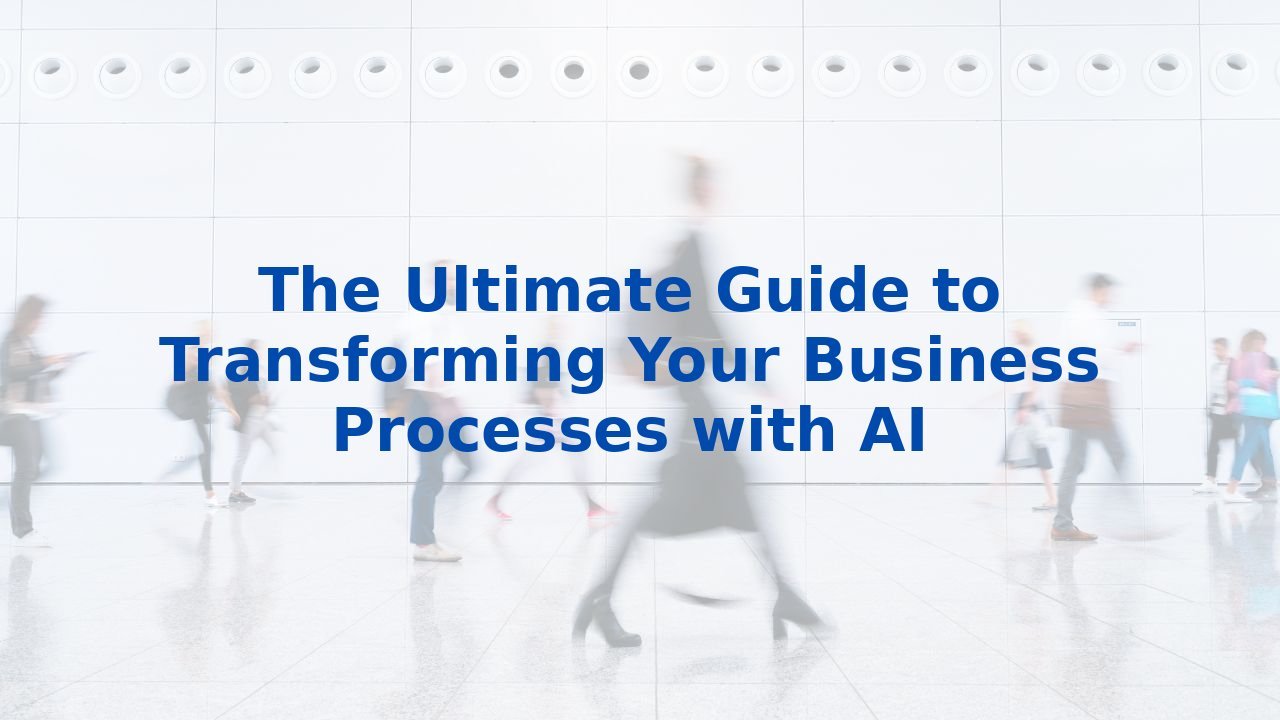The Ultimate Guide to Transforming Your Business Processes with AI
The Ultimate Guide to Transforming Your Business Processes with AI
In today's fast-paced business environment, standing still is not an option. The processes that once propelled organizations toward success may now hinder growth and innovation. As businesses navigate these challenges, the realization often dawns that their true obstacles lie beyond surface-level issues. Companies like Coca-Cola and Nike focus on branding and marketing, while others prioritize operational efficiency and product excellence. Enter artificial intelligence (AI)—a transformative force that can streamline processes and elevate organizations to new heights.
Enhancing Business Processes: The Heart of Innovation
Every business is fundamentally about optimizing resources, particularly human capital. In consulting and professional services—like accounting—companies operate largely in the recruiting and training arena. Leading firms have mastered the art of hiring and retaining top talent, constantly refining their processes. Yet, the quest for efficiency doesn't end there. Identifying and optimizing existing workflows is crucial for sustainable growth.
The Role of AI in Business Process Management
Artificial intelligence is not just a buzzword; it’s a game-changer. From automating mundane tasks to enhancing decision-making processes, AI can introduce substantial efficiency gains. Below are some key areas where AI can revolutionize business process management:
1. Process Discovery and Mapping
AI tools employ process mining and pattern recognition to reveal a company's existing workflows. By generating accurate process maps, organizations can visualize how data flows through their systems, identifying bottlenecks and redundancies along the way.
2. Process Automation
Imagine a world where tedious tasks like data entry and document processing are handled by AI bots. This automation reduces workloads, minimizes errors, and lowers the demand for manual labor, allowing human resources to focus on high-value tasks.
3. Continuous Improvement
In the pursuit of excellence, continuous improvement is key. AI provides ongoing feedback and performance insights, enabling businesses to adapt their process management strategies to remain relevant and competitive.
4. Data Analysis and Insights
Data is the new oil, and AI excels in mining these valuable resources. Through advanced analytics, AI can spot trends, predict outcomes, and dive deep into root causes, helping businesses make informed decisions that drive growth.
Benefits of AI in Business Process Management
The impact of integrating AI into business processes is tangible. Here are some of the most significant benefits:
- Productivity Boost: By automating repetitive tasks, AI allows organizations to accomplish more with fewer resources. This frees up time for teams to concentrate on strategic initiatives.
- Cost Reduction: AI minimizes errors and optimizes resource allocation, resulting in substantial cost savings.
- Better Decision-Making: Utilizing data-driven insights from AI helps businesses make timely, accurate decisions.
- Improved Compliance: AI's consistent execution of processes helps organizations adhere to industry standards, reducing the risk of fines.
- Enhanced Customer Satisfaction: Through personalized support and faster response times, AI-driven solutions improve customer experiences, fostering loyalty.
The Importance of Training Employees for AI
Even with powerful AI tools at their disposal, businesses can only realize their full potential when employees are trained to harness these technologies effectively. Here’s why investing in AI training is essential:
- Enhanced Collaboration: Employees adept in AI can seamlessly integrate these tools into their workflows, maximizing productivity.
- Improved Decision-Making: Understanding AI allows employees to leverage its insights for better decision-making.
- Adaptability: As AI transforms business processes, trained employees can navigate these changes with ease, ensuring agility in a dynamic environment.
- Reduced Risk: Proper training mitigates the risk of over-reliance on AI, ensuring that human insight is balanced with automated suggestions.
Conclusion
AI indeed has the potential to be a transformative force in any organization. By automating tasks, improving decision-making, and fostering an environment of continuous improvement, businesses can optimize their processes significantly. The journey towards efficiency begins with understanding the role of AI in process discovery, automation, and ongoing refinement. However, to maximize these benefits, organizations must prioritize employee training—a crucial step to remain competitive in an ever-evolving market.
For those ready to embrace this technology, consider exploring a complete AI training program tailored for your entire workforce, ensuring that everyone is equipped with the skills necessary to thrive in this exciting new landscape.



